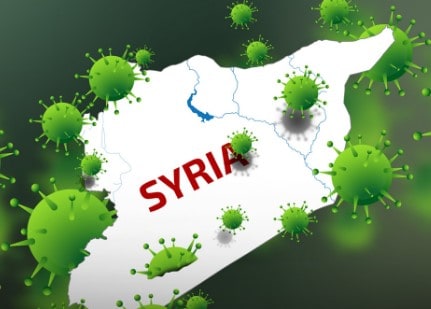In the recent weeks, Syria has seen a surge of COVID-19 cases in areas under the control of the Assad regime. According to data released by the Syrian Health Ministry, cases began to spike in July, with 478 new infections confirmed, more than the total of cases confirmed from the outbreak of the virus in the country until the beginning of that month.[1] In August the spread of the virus accelerated, and by August 25 the number of cases reached 2,365, and the number of deaths stood at 95. [2]
However, Syrian opposition elements have been claiming for months that the true number of cases in Syria is much higher, and that the regime is hiding the real figures and even arresting healthcare professionals who disclose accurate information about the spread of the disease.[3] Recently, in an unusual step, pro-regime elements also agreed that the figures released by the regime do not reflect the reality on the ground, due to insufficient testing for COVID-19. This claim was voiced by doctors and healthcare officials in regime-controlled areas, as well as by pro-regime journalists and media outlets. They warned that the real number of cases and deaths is several times higher than the official figure, and called on the regime to stop publishing inaccurate data. In addition, the Syrian government daily Teshreen and the Lebanese daily Al-Akhbar, known for supporting the Assad regime, criticized the regime's handling of the coronavirus crisis, accusing the government and its ministries of negligence and incompetence that only exacerbates the spread of the disease. The criticism eventually prompted the regime to admit that the official figures were inaccurate.
This report reviews the claims by pro-regime elements in Syria regarding the inaccuracy of the coronavirus statistics reported by the regime, and the criticism against the regime's handling of the crisis.

(Source: Josoor.co)
Syrian Healthcare Professionals: The Figures Reported By The Health Ministry Are Far From Accurate
As stated, claims regarding the inaccuracy of the figures published by Syria's Health Ministry were made, inter alia, by health professionals in the regime-controlled areas of Syria. Dr. Nihad 'Assaf, a physician from Damascus, wrote in a July 24, 2020 Facebook post: "Health Ministry, are you convinced of what you are reporting? As much as I appreciate the ministry employees, especially all those dealing with the coronavirus, and thank them for their efforts, I wish to say that the figures you have published regarding the number of cases, deaths and recovered patients, especially this past week, are far removed from the reality we doctors see on the ground, and cannot possibly form a good basis for drawing up strategies and plans for fighting the pandemic… The real number of cases is much higher than the figure you publish, which has become a sort of joke among clinic and hospital staff. It is true that most of the patients we see have mild to medium symptoms, whereas the severe cases are relatively few, but [the severe cases] do exist. In medical school we learned that statistical surveys are an important [tool] for monitoring a disease and forming plans for dealing with a pandemic, but only if the figures are real. The figures released by the Health Ministry do not reflect the real spread [of the virus], and it would be better if [the Ministry] stopped publishing these misleading figures. We need to expand the sectors subjected to PCR testing,[4] [but] there is no shame in being unable to administer these tests [in sufficient numbers], because some large countries have also been unable to do so. The important point is to avoid misleading ourselves, and to acknowledge the truth as it is. Why can't the Health Ministry spokesman [admit] that the ministry's current abilities do not allow it to perform more tests, and that it needs help from other ministries and even from non-government elements in bearing this burden? Would anyone mind [if the ministry admitted this]?"[5]

Dr. Nihad 'Assef's post
The Director of Health in Al-Suwayda Governorate in southern Syria, Dr. Nizar Mhanna, wrote on Facebook on August 2: "[Even] in Britain, the advanced healthcare system was unable to thoroughly test the entire population for the virus, despite performing 25,000 tests every week. Accordingly, the healthcare officials there estimated that the real number of cases was 20 times higher than the number of cases confirmed and recorded. Here in Syria, the ability to carry out tests, and the resources [available for this] are limited for reasons known to all: the war, the sanctions and the ten-year siege. In light of this, it stands to reason that the number of cases is many times higher than the number of confirmed and recorded cases, especially since there are also asymptomatic cases. Here in Al-Suwayda Governorate, the number of people who report to the hospitals, health centers and private clinics, or phone in with suspected symptoms of COVID-19, is estimated at dozens a day…"[6]
Dr. Essam El-Amin, director of Al-Muasa Hospital in Damascus, told the Syrian government daily Al-Ba'th on July 28 that, on average, over 25 people with chronic diseases die of coronavirus in Syria every day.[7] This belies the figures published by the Health Ministry, which on August 11 put the total number of coronavirus deaths in Syria since the outbreak of the virus at 53. [8]
Pro-Regime Media: The Virus Is Spreading Due To Negligence Of The Syrian Healthcare System
SUPPORT OUR WORK

Claims regarding the inaccuracy of the Health Ministry data were also made by journalists and media close to the Assad regime. Mohammed Al-Khader, a reporter for the Al-Mayadeen channel in Damascus, wrote on Facebook on July 27: "The number of COVID-19 cases is much higher than the official figure [released by] the Health Ministry, which has reported about 650 cases [so far], and it will not be an exaggeration to say that it is many times higher than the stated figure. The same goes for the number of deaths. Suspected cases are not always tested. Tests are administered based on the number of symptoms, and only to people who come to the clinic to find out for sure [if they have caught the virus]. To date, the number of tests performed by the laboratories does not exceed 300 a day. For the sake of comparison, Saudi Arabia performs 10,000 tests a day and Turkey 30,000. The disease has spread and continues to spread very rapidly due to negligence and due to crowding on [public] transport and in markets, bakeries, election rallies and shopping festivals!! A significant number of the precautionary measures [against infection] are individual measures and can be taken despite the poverty and material shortages. [These are] simple measures of [social] distancing. What many people are doing on social media -- announcing that they contracted the virus and advising [others on how to avoid this] -- is brave and noble, and raises people's awareness more than any other measure…"[9]

Mohammed Al-Khader's post
The Lebanese Al-Akhbar daily, which supports the Syrian regime, accused the Syrian Health Ministry of negligence, and pointed to wide discrepancies between the government's official claims regarding its handling of the virus and the actual reality on the ground. For example, the daily noted that, since the Syrian hospitals have reached capacity, the Health Ministry launched a coronavirus hotline dispensing distance medical services, but that this hotline is rarely available. It claimed further that, contrary to the ministry's claims, hospitals do not meet the required standards in terms of disinfection and other precautionary measures against spreading the virus. Syrian citizens claimed that nurses do not always wear masks and gloves, that seats and oxygen tanks are not disinfected between patients and that even bedsheets are not always changed.[10]
Columnist In Government Daily Teshreen: The Government Is Evading Responsibility, Laying It On The Citizens
Criticism of the Syrian government's response to the pandemic was also expressed in the Syrian government daily Teshreen. Columnist Salman 'Issa attacked the government following July 20, 2020 statements by Health Minster Nizar Yaziji, in which he rebuked the public for insufficient compliance with the ministry's COVID-19 directives.[11] 'Issa said that the government must not lay the responsibility for curbing the pandemic on the public, especially when the government itself has not taken measures to make it easier for the public to follow its guidelines. He wrote: "The Health Ministry and the government team responsible for fighting the coronavirus [are trying], with unprecedented insolence, to evade responsibility and lay it on the citizen. This leads us to ask: What have the ministry and this team done to make it easier [for people] to practice social distancing, especially after the Ministry of Domestic Trade and Consumer Protection failed to ensure the supply of basic goods and thereby at least prevent people from crowding in front of the supermarkets…? Moreover, [the Ministry of Domestic Trade and Consumer Protection] calls to hold fairs and markets and urges the Ministry of Trade and Commerce to hold them.
"What has the Health Ministry done about supplying [the public with] PPE, such as medical gloves, masks and disinfectant? Has it managed to lower their cost and make sure they are available at a reasonable price, since it is [surely] aware of the extent of the blackmail that pharmacists have practiced, and continue to practice, against the public since the outbreak of the coronavirus crisis? Does [the ministry] think that any father can buy five masks, the average number required by a family, at a cost of 400 liras per mask, when most families have difficulty putting food on the table…? Have the local councils managed to reduce the crowding on public and private transport, when 20 passengers squeeze into a cab meant for no more than 14?
"What the Health Ministry said last Monday [July 20] confirms its lack of transparency in publishing the number of cases since the outbreak of the virus. [The ministry] and its staff warned us that they have done everything they could, and that everything else is up to the citizen. Everyone already knows quite a bit about this disease, its symptoms, the ways to avoid it and the importance of disinfection. But how many of these precautionary measures have [the ministry and its] staff made available to the public at prices that most citizens can afford?! It is true that they allocated 100 billion liras to fighting the virus, or so the news reports claimed. But curiosity moves us to ask: Has any of this money been used to support the manufacture of PPE…? As long as things continue to be handled in this manner, the ministry [seems to be] pushing us to drown in the sea when we lack the means to swim in it!"[12]
Syrian Health Ministry Admits: The Official Number Of COVID-19 Cases Is Inaccurate
Following this criticism from the Syrian health sector and the pro-regime press regarding the accuracy of the COVID-19 statistics, on July 30, 2020 the Syrian Health Ministry issued a statement clarifying that the figures it possesses are not comprehensive. It stated that "the number [of COVID-19 cases] recorded in Syria includes only the cases confirmed through PCR testing and does not include asymptomatic cases. Moreover, due to the unjust economic siege imposed on the country, which has harmed the health sector and all its components, the ministry lacks the ability to carry out general testing in the [various] governorates, and this underscores the need to carry out individual precautionary measures so as to stop the spread [of the virus] and protect us all."[13]
[1] Sana.sy, July 27, 2020.
[2] Sana.sy, August 25, 2020.
[3] Euphratespost.net, July 26, 2020; orient-news.net, July 27, 2020; zamanalwsl.net, July 29, 2020. See also MEMRI Inquiry & Analysis Series No. 1507 - Syrian Opposition Websites: The Iranian Militias Are The Main Vector For Mass COVID-19 Infections In Syria – And The Syrian Regime Is Keeping It A Secret – March 30, 2020.
[4] PCR [polymerase chain reaction] testing, which detects the presence of viral RNA, is the most common type of testing currently used around the world for diagnosing COVID-19.
[5] Facebook.com/profile.php?id=100046404519837, July 24, 2020.
[6] Facebook.com/drnizar.mhanna, August 2, 2020.
[7] Al-Ba'th (Syria), July 28, 2020.
[8] Sana.sy, August 11, 2020.
[9] Facebook.com/alkhdermohmd, July 27, 2020.
[10] Al-Akhbar (Lebanon), August 3, 2020.
[11] Sana.sy, July 20, 2020.
[12] Teshreen (Syria), July 22, 2020.
[13] Facebook.com/MinistryOfHealthSYR, July 30, 2020.





